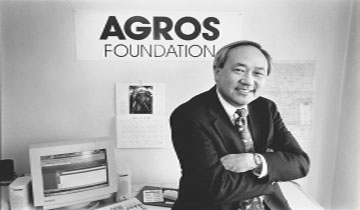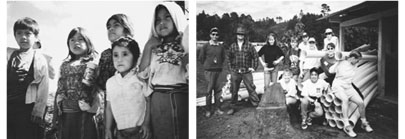"Why not buy land privately and put it into the hands of the poor? Doesn't the body of
Christ
have those
kinds of
resources?"
- Skip Li '66
Story by
Photos by
Connie McDougall
Jon Warren
Bryan Cook
Don Clark
Connie McDougall
![]()

![]()

![]()


Alumnus Skip Li recently opened a new office in Seattle and he's enlisted the help of SPU students in Agros projects.
In the fall of 1982, Skip Li sat in the shadows of a hotel room in Guatemala City trying to convince six suspicious nationals that he could help the poor of their country. He had come at great personal risk. Guatemala was in the throes of a bloody civil war with no end in sight. "There was hardly anyone on the plane when I flew in," recalls the 1966 Seattle Pacific graduate, "and the airport was dark, with armed men everywhere."
The Guatemalans with whom he met - elders from a large evangelical church - listened cautiously. They had heard promises before and Li was left to prove himself. "I wondered what one Chinese guy could do to change 400 years of history, but there I was."
What began then has grown into The Agros Foundation, a Christian organization devoted to assisting Latin American peasants to purchase their own land. The group is made up of an international cast of characters - including a dozen or so Guatemalan leaders; an array of North American volunteers; hundreds of poor Mayan Indians; and of course, one Chinese guy, Skip Li.
The seeds of Agros are found in Li's childhood. As the son of a Chinese diplomat, Li was born in India and lived in several nations before he could walk. His most formative years - between the ages of 10 and 16 - were spent in Guatemala and Colombia.
Latin America was an adventure, but there were moments of discomfort. Although Li was fluent in Spanish within months, a Chinese boy in a Latin culture stands out. "I was sometimes called 'Chinito,' which is half affectionate and half derogatory," he says.
Li loved Latin America and its people. As a young man, however, he left for the United States, entering Seattle Pacific College as a sophomore. Looking back on his campus experience, Li most values his interactions with the professors. "People like Roy Swanstrom, Wesley Walls and Mel Foreman were examples of what lifelong commitment to a cause means," he says.
Li went on to become a U.S. citizen and successful lawyer in Seattle. He stayed involved with his alma mater as a member of the SPU Board of Trustees from 1976 to 1984, and continues to serve the campus as general legal counsel to the University.
As the years unfolded and his practice grew, Li admits to feeling puzzled about God's plan for him. "It always bothered me: Why did God give me the background I had when I wasn't using it?"
The answer came 20 years later when Li heard Argentine evangelist Juan Carlos Ortíz. "He made a casual remark about the U.S. spending millions of dollars for arms in the Caribbean to fight communists," recalls Li. "Then he said, 'If you bought land and gave it to the poor, that would solve your communist problems.'"
Li pondered the comment. He knew that Latin American land reform was either non-existent or a failure, and that unequal distribution of wealth created great social and economic strife. "I realized that land doesn't have to involve government. Why not buy land privately and put it into the hands of the poor? Doesn't the body of Christ have those kinds of resources?"
He persuaded the Guatemalan elders that he was trustworthy and that the plan could work. With financing from World Concern and an anonymous donation of $10,000, Agros was officially launched in 1982.
Agros, which means "soil" and "earth" in Greek, buys land at fair market value. Local churches help identify poor families willing to commit to the hard work of creating a village. Selected families build the village while paying off the loan through income generated from the land. The money is then used to purchase more property. Eventually, villagers receive clear title.
This is remarkable because land ownership is unknown among the Indian peasants of Guatemala. Victims of the civil war and hundreds of years of extreme discrimination, indigenous populations are utterly without means to better themselves.
Which is why Juan Cedillo Rivera still can't believe his good fortune. The 44-year-old Ixíl (Ee-SHEEL) Indian is a member of the newest of six Agros villages, El Paraíso or "Paradise."
"The happiness to have our own piece of land - it is like a dream," Rivera said on a sunny day in December as SPU students helped dig a water ditch to his village. "It would have been impossible for me to buy land. We are safe here. We will live all our lives here."

L: Fresh Water is a major improvement in the lives of the people of Paradise, especially the children.
R: The 1997 SPU SPRINT team stands amid a mountain of pipes which carried water to the village by Christmas.
Like Cedillo, he, too, found a new life in the communal atmosphere of an Agros village. "To have a home and land means safety for my family," says Mendoza quietly. "I know if we work hard, our lives will improve."
The work is very hard indeed. Land is cleared with basic tools, often handmade. Villagers construct their own cement blocks and then build two-room homes from the blocks. They dig miles of ditch and lay miles of pipe for running water. There is no electricity.
Occasionally, villagers resist "improvement." Alfred Kaltschmitt, a Guatemalan of German heritage and the first chairman of the Agros board of directors in Guatemala, offers an example. Years ago, he tried to persuade villagers they should have two rooms in their homes: one for their fires, and another for living quarters. But the Indians wouldn't hear of it. Kaltschmitt finally discovered why.
"Fire is important to them," he says. "Fire is safety, warmth and community. They did not want to be separated from that."
The organization has developed a working model which can be used "wherever there is disproportionate land ownership," explains Li. "Land is bought privately, and we work with local indigenous leaders. This is about self-determination, not paternalism. I learned early on not to impose our way of doing things. Americans want to say, 'Here's your harvest schedule,' that sort of thing. We don't do that."
Finally, Agros depends on volunteers from the U.S. "We don't just want people's money," Li emphasizes. "We want the investment of a person's life. Everyone benefits then."
Besides Li, two other Seattle Pacific alumni are involved in Agros. Del Wisdom '64 and Wes Anderson '67 now serve on the Foundation's American board of directors. Also, for the last two years, students have volunteered in Agros projects through the SPRINT program (Seattle Pacific Reachout International).
Agros has come of age. With the professional expertise of its Guatemalan director, Tomas Godinez, and his assistant, Julio Way, the organization now uses a holistic approach that confronts all the needs of the poor at once - including education, economics and health.
So successful is it, Agros recently purchased two new parcels of land in Guatemala and a third in Nicaragua. "By the year 2020, we hope to have a thousand villages all over Latin America," says Li.
No one associated with the group doubts that. Perhaps their faith in Agros is best explained by a similar-sounding word in Spanish. It is "mílagro," which means "miracle."
![]()

Please read our disclaimer.
Send any questions, comments or correspondence about Response to
jgilnett@spu.edu
|